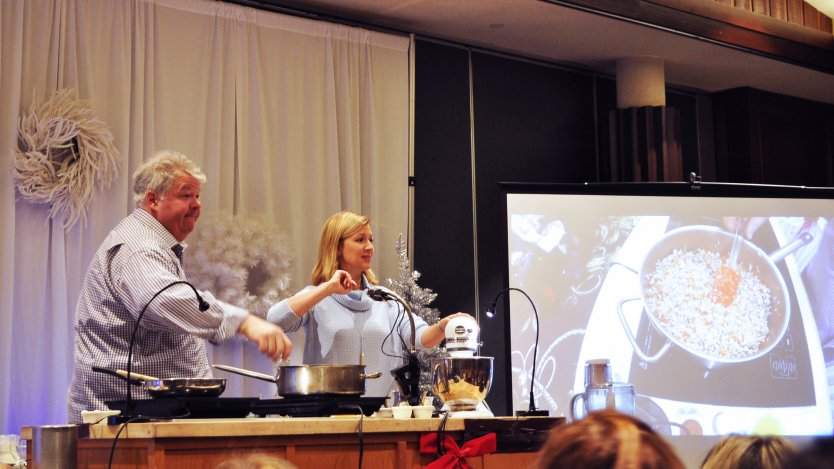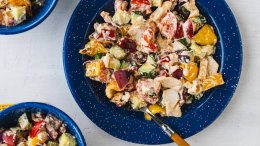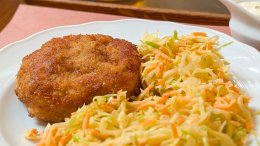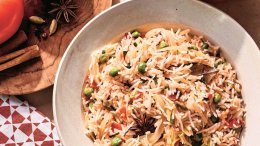Dessert lovers and avid bakers will likely remember Anna Olson's show, Sugar, on Food Network Canada. That show premiered in October 2002. Food programming has come a long way, and so have people's knowledge, expectations and perceptions of food in this country. Olson has been instructing and entertaining viewers since then, with Bake with Anna Olson as her current show, so we decided to pick her brain about desserts and the evolution of the elusive Canadian identity, not coincidentally at the uniquely Canuck Christmas in November event at Fairmont Jasper Park Lodge in Jasper, AB. She'll be the first to take on a debate about us not having a culinary identity.
Let's talk a bit about the regionality of Canadian food.
There is an energy, this community spirit when you come to Calgary, Edmonton, or Vancouver. Vancouver is on its own out there in the West and there's that connection with what’s going on in the U.S. There’s such a parallel with what’s going on in Seattle and Portland and I think it’s really cool.
You've been in the food scene for a long time. What do you think is the shift in the food scene and people’s perception of food?
It has certainly become more sophisticated and more widespread. When I first started, Food Network was it. They owned studios and you would do studio-based programs -- that live-to-tape format, six-minute slot, with no post production editing -- and then that fascination grew into the more sophisticated cooking instructions, and then reality-style just came in from that side angle. There were no celebrity chefs when I first started, and now that we are watching TV differently, all of a sudden, what we want as a viewer, we expect to find it. There seems to be a group that loves reality and a group that wants instructional, and they are two different markets. In a small country like Canada, how do we accomplish that? In bigger markets like the States, they have two cooking channels: they have one that focuses on the reality shows, and they have one that focuses on the instructional. We’re a bit small for that.
There are also a lot of travel-style food shows now. Thoughts?
Armchair travelling. You can travel and eat without dropping $10,000 on vacation. I’d love to do a travel dessert show, because there’s not one. There’s not a lot of female hosts, either, that do the travel shows. I would love to go off to explore the whole world of pastry, globally, as its own category. There's such an art and elegance to pastries and desserts and I don't think it’s been explored at all. I’d love to go do that.
Sometimes, there’s a more focused regionality to desserts than you realize or more personal family heritage than we realize. You learn how to make creme brulee in cooking school, but I know when I started as a pastry chef in a restaurant, I would put in so many of the things I learned from my grandmother because I wanted to set myself apart. I want my menu to be distinctive from a regular menu. Now you’ve got these little boutique bake shops that are all the rage, like for cupcakes, macaron or anything. Man, you’ve got to be so good. And then there’s the evolution of desserts like the sachertorte at the Hotel Sacher -- we need to appreciate what makes that so distinctive and learn what’s behind it.
There’s my pitch, right there. Just have me as the host.
People don't often think about desserts at a restaurants, but places like Richmond Station have amazing dessert.
It's so innovative and original, and well composed. I think it's a real reflection of dessert trends. That’s not how a home cook will bake, ever, but that’s why you go out to eat.
What I love about my career is that there's restaurant pastry chefs, there’s retail bakery pastry chefs and then there’s the home bakers. They are three distinct categories. I had to learn, almost the hard way, when I made the leap from restaurants to retail, how all those elements in a Richmond Station dessert make that beautiful bite on your palate when you put them all together. When you make a retail dessert that customers are going to take home, and you have to assume that they’re just going to take one piece of what you’ve made and put it on a plate, you have to deliver all of that within one unit. In the restaurant, you have complete control over every little drop, sprinkle, swish and brush stroke.
What about the evolution of Canadian food identity?
It took me travelling outside Canada to realized the world knows our culinary identity. We’re talking about the regionality and how we struggle with it -- we’re just giving ourselves stress. We’re being so introspective. We’re not to the point where you can go to Singapore and say, “I’m in the mood for Canadian food; let’s go to a Canadian restaurant for dinner." But, there are flavours that people know. I think what we take for granted, as Canadians, is not just the seasonality of our ingredients, but the seasonality of our cooking methods. That is uniquely Canadian and special. Whether it’s Toronto, Vancouver, Montreal, Halifax or Fogo Island, we’ve got four distinct growing seasons but within that, four ways in which we handle either common ingredients throughout that year or those different ingredients.
I’m demo-ing tourtiere here at Jasper. It would not occur to any Canadian to eat tourtiere in July; but that method, that technique and that treatment is a winter preparation.
You're one of a few chefs who says we have a clear Canadian food identity.
I go to Singapore, Manila or Bangkok, and I’m doing cooking demonstrations, and people are asking me about butter tarts and tourtiere, and they want to see me make Nanaimo bars. They may not know that Nanaimo is a city, but they know it’s Canadian.
Maybe that’s our insecurity because we’re neighbours to the States and they’re big. With more people, that evolution can happen faster, but it’s a small world now. I look at what Tres Carnales is doing in Edmonton, and Danny’s Mexican and he’s taking his heritage but using local ingredients. How Canadian is that? Is that not acknowledging who we are as a nation, built up of people all over the world?
I found people were fascinated, especially people in the equatorial countries, by the fact that we have access to different ingredients in different times of the year. Not only do we cook with different ingredients, but we treat them differently. Even for something generic, like skinless boneless chicken breast, we would grill it and serve it with fresh salad and a salsa made with local peaches and fresh mint and basil in the summer; but in winter, we would pan sear it and serve it with a maple onion cream sauce. I know Vermont likes to promote its maple but the world knows that maple is Canadian.
Isn’t it funny that we have to be told by somebody else?













